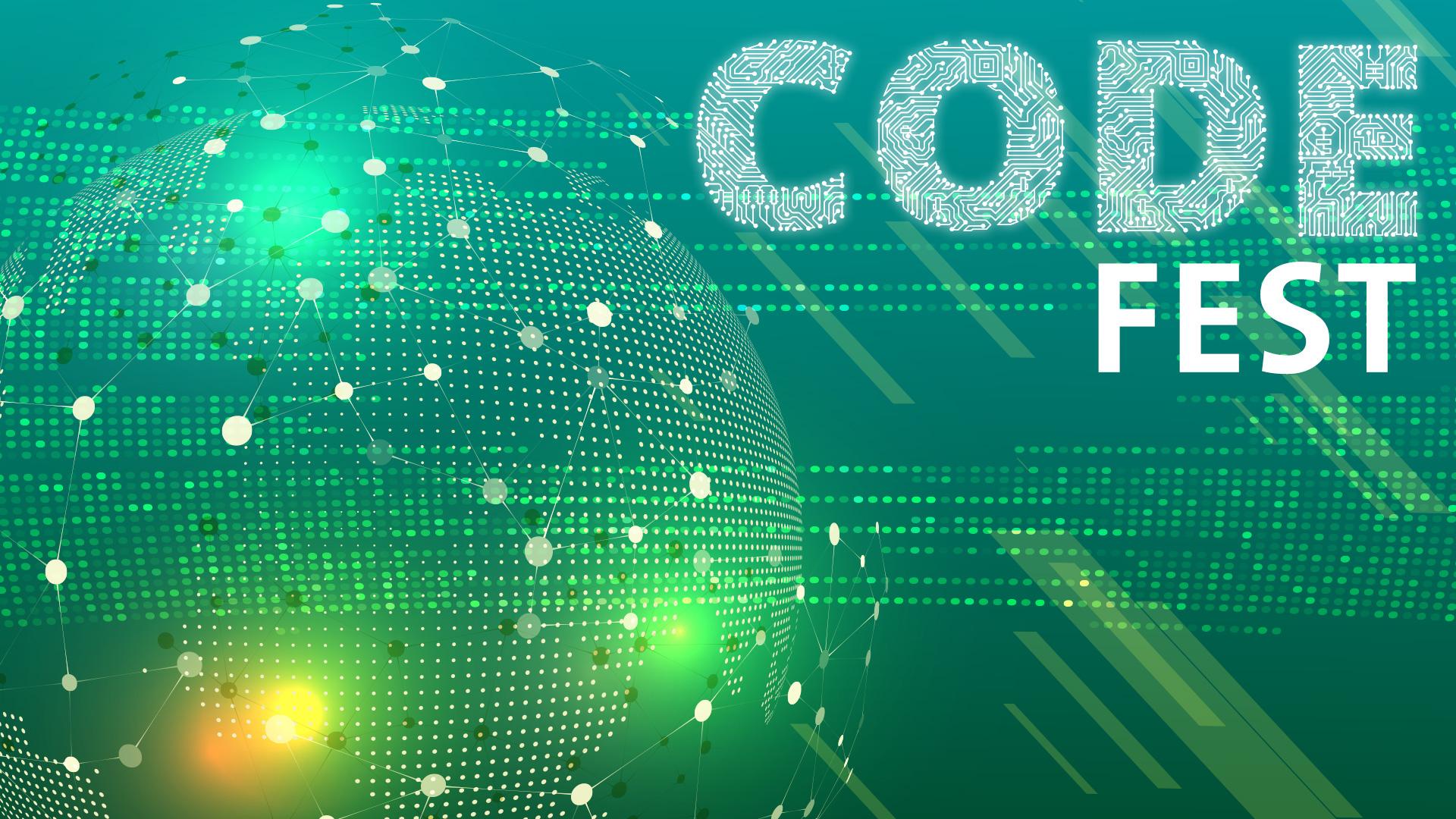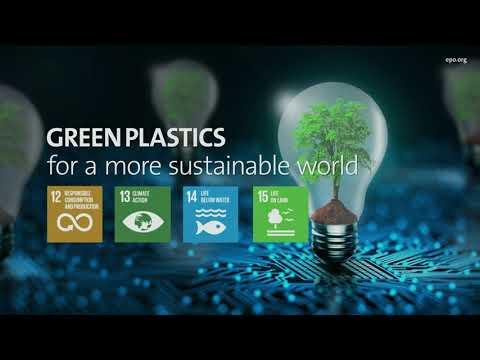CodeFest on Green Plastics
The award ceremony
on Thursday 23 February 2023, from 14.00 to 15.00 hrs
The EPO's first ever public CodeFest tackles one of today's key sustainability challenges: ridding the planet of plastic waste. Global success depends on access to the right kind of know-how and that's what this major new competition is all about: making the know-how contained in patents concerning green plastics more readily available to innovators everywhere.
The ultimate aim is to inspire future innovation that supports healthy ecosystems and drives the circular economy for plastics. In alignment with the United Nations Sustainable Development Goals (SDGs), we are taking our commitment to sustainability and monitoring green technologies to the next level with initiatives such as the CodeFest on Green Plastics, which is of special relevance to SDG 12.
Background
The EPO's unparalleled data resources are relied upon by a range of governmental and international organisations, such as IP Offices, the OECD, International Energy Agency (IEA), International Renewable Energy Association (IRENA) and European Commission, as well as researchers and patent information specialists. The CodeFest on Green Plastics is a majoThr opportunity to help improve access to these data resources and contribute to the development of an automated classification scheme for sustainable technologies. The competition will also help prepare the way towards creating a platform for exchange on AI-based approaches to organising the EPO's wealth of patent information.
Further information
Classification scheme for sustainable technologies
- The code challenge
-
Help achieve a more sustainable future
Some of the groundwork has already been done in a recent EPO study on patents for tomorrow's plastics. This shows how patent data reflects the rapid rise in innovation in plastics that are easier to recycle, as well as in recycling technologies. The study also suggests that there is great potential to turn pioneering research in the field into inventions that can then be brought to market. "Patents for tomorrow's plastics" provides an excellent introduction to the topic and an important starting point for anyone wishing to take on the current code challenge, which is:
To develop creative and reliable artificial intelligence (AI) models for automating the identification of patents related to green plastics.
Participants
We are calling on talented minds aged 18 and over to register for the event by 13 November 2022, either in an individual capacity or as a team of up to five people. Anyone resident in one of the EPO member states is eligible to enter. Teams of EPO colleagues, external entrants or a mixture of both are all welcome!
In order to participate you must meet all eligibility criteria included in the rules of the competition.
The prizes
Each of the prizes will be accompanied by a trophy.
- Grand Prize winner: EUR 20 000
- 1st runner-up: EUR 15 000
- 2nd runner-up: EUR 10 000
- Jury
-
Submissions will be evaluated by senior specialists from across the EPO working in sustainability, IT, data science and AI, as well as patent information and analysis.
Abderrahim Moumen
Abderrahim is the EPO's operational Director of Data Communications and Applications. He also co-chairs the AI and Emerging Technologies Task Force in operations, is a member of the Computer-Implemented Inventions working group and has managerial responsibility for standards. His areas of interest include AI, the Internet of Things, quantum computing, 5G, smart antennas and standards. Prior to joining the EPO in 2000 as an examiner working in the field of antennas and microwaves, Abderrahim completed a Ph.D. in telecommunications and radar technologies at Delft Technical University, in The Netherlands.Alexander Klenner-Bajaja
Alexander heads up the EPO's Data Science department and manages the EPO's strategic artificial intelligence programme. He organized the first ever internal EPO CodeFest and developed the winning solution into an operational product. He has in-depth knowledge of machine learning as well as AI metrics and evaluation criteria.Angel Aledo López
Angel joined the EPO in January 2019 and was appointed Chief Technology Officer in March 2019. During his career, he has held different positions in both technical and managerial roles and contributed to the digital transformation of several organisations. Angel has also assisted with academic research, the development of tools for the management of IP rights and corporate websites and advised widely on the use of state-of-the-art technology to improve business processes.David Horat
David is Head of Prior-art Data Management at the European Patent Office, leading an international team of over 100 people delivering more than 1 000 data pipelines. He was previously IT Director at the Oceanic Platform of the Canary Islands, where he led the organisation's digital transformation, and a software engineer at CERN (European Organization for Nuclear Research), where he architected a federated grid computing testing system that monitored the resources of over 300 data processing centres. David holds an M.Sc. in computer science, an LL.M. in intellectual property and business management and an executive programme certificate in leadership.Domenico Golzio
Domenico currently advises the EPO's Chief Information Officer and Chief Technology Officer. His previous positions include Director of Search and Examination Unit, where he led a team developing tools for prior art search and patent information and created the artificial intelligence (AI) department. He Domenico has conducted research into various aspects of intellectual property rights, including the relationship between patents and innovation, patent information, international patent portfolios and comparative analysis of different patent systems. Prior to joining the EPO as a patent examiner in the field of ICT, Domenico worked as an electronic engineer in the telecoms, automotive and aerospace industries. He holds a degree in physics.Marco Bravo
Marco is the EPO's Director of Patent Knowledge Promotion and acting Director of Patent Data Management. He is an expert in innovation, technology transfer and IP-based commercialisation. Mr. Bravo has founded four tech companies and a business angel fund, and actively mentored over 200 technology entrepreneurs from multiple countries. His professional experience spans industry, academia, government, and entrepreneurship, with extensive cross-cultural experience in Europe, the United States and Asia.Roberta Romano-Götsch
Roberta is Chief Sustainability Officer at the EPO. In her previous roles at the EPO as Chief Operating Officer, first of Mobility and Mechatronics and then of Healthcare, Biotechnology and Chemistry, she was responsible for leading patent examiners, managers, formalities and administrative staff in Munich, Berlin and The Hague. Roberta received her PhD in organic chemistry from the Technical University of Munich and was R&D product manager at Procter & Gamble before joining the EPO in 1997.Yann Ménière
Yann joined the EPO as Chief Economist in 2016. For many years, he has provided expert economic insights into issues relating to patents, innovation and growth, including as a regular contributor to a range of public and high-level forums. Prior to joining the EPO, Yann led the Chair on IP and Markets for Technology at MINES ParisTech, where he was a professor of economics. He also lectured on the economics of intellectual property (IP) at Imperial College London, the Université catholique de Louvain in Belgium and CEIPI in France. His research and expertise relate to the economics of innovation, competition and IP. - Timeline
-
There are five key stages to the competition:
Thursday 15 September 2022, 12.00 hrs CEST
Registration opens!Registrations closed!
Entrants must register for the challenge until 13 November 2022, 23.59 hrs CET. Registration includes entrants submitting an outline of their approach for solving the code challenge. Proposals must include an explanation of the intended approach and indicate the intended data selection, the possible model implementation and model evaluation.
13 - 14 November 2022
The jury evaluates the submissions.Tuesday 15 November 2022, 12.00 hrs CET
The code challenge is on!The jury communicates the outcome of the previous evaluation to participants. All successful candidates will be given access to our EP full-text dataset and to Open Patent Services (OPS). The code challenge runs for just over eight weeks and solutions must be submitted until 15 January 2023 at 23.59 hrs CET.
16 January - 3 February 2023The jury evaluates the submitted solutions and selects the finalists of the code challenge.
Monday 6 February 2023Announcement of the finalists!
Finalists are invited to the EPO CodeFest on Green Plastics ceremony.
Thursday 23 February 2023, 14.00 hrs CETEPO CodeFest on Green Plastics ceremony
During the online ceremony, the winners are announced and prizes awarded. Details of the full programme will follow soon.
- Registration
-
Registration to join the competition is closed
Registration deadline
Sunday 13 November 2022.
Data Protection Statement (DPS)
Rules of Competition (RoC)
- Award ceremony
-
Over 60 individuals took up the code challenge to develop an AI model that improves access to patent information on green plastics. After fierce competition, six finalists convinced the jury with their creative code, demonstrating how their models could help innovators learn from patent know-how and rid the planet of plastic waste.
- Finalists and summaries of the solutions
-
CodeFest was open to residents of EPO member states, including EPO staff. The challenge drew a broad range of individuals and teams from all over Europe, with each developing creative solutions for identifying green plastics. These are the finalists.
AI4EPO
This team's model uses state-of-the-art AI pipelines and large language models from OpenAI for zero-shot, few-shot and other approaches to arrive at a custom MLP neural network for binary and multi-label classification.
Team members:
- Dimitrios Skraparlis (EPO)
Dimitrios Skraparlis is a patent examiner at the EPO. He has experience in industry and academia (Nokia, Toshiba, IBM Research, Siemens, NTUA and as freelancer) and holds a PhD (National Technical University of Athens), an MSc (University of Bristoland a diploma of electrical and computer engineering (Aristotle University of Thessaloniki, Greece). He is named inventor in eight patents and has published in several international peer-reviewed journals, conferences and book chapters. Dimitris is passionate about technology and AI as an enabler for automation and innovation. - Prodromos Malakasiotis
Prodromos Malakasiotis is a principal machine learning engineer at Workable and a visiting researcher at Athens University of Economics and Business, where he completed a PhD, an MSc in computer science, and a BSc in informatics. His research focuses on deep learning for natural language processing and especially semantic similarity for texts, zero and few-show learning, and transfer learning. He is passionate about applying research both in industry and to accommodate everyday needs. Prodromos has published more than 30 papers in high-profile academic conferences and journals and has an h-index of 19 and i10-index of 27. - Stavros Vassos
Stavros Vassos is the CEO and co-founder of Helvia.ai, a startup transforming business communication by harnessing the power of language AI. He holds a PhD and MSc in AI from the University of Toronto, and has worked as an assistant professor in the Sapienza University of Rome. In 2008, he received the Outstanding Paper Honorable Mention Award from the Association for the Advancement of Artificial Intelligence (AAAI), and in 2017 he received the Seal of Excellence for "StoryBots: Verifiable Storytelling in Conversational Interfaces" under the EU Marie Skłodowska-Curie actions. - Odysseas Diamantopoulos
Odysseas Diamantopoulos-Pantaleon is a post graduate student in the computer science postgraduate program of Athens University of Economics and Business (AUEB). He completed his undergraduate studies in computer science at AUEB with specialisation in Data Science. Odysseas has also completed a minor in philosophy at The American College of Greece - Deree. Currently, he holds a position a research Assistant at the Mobile Multimedia Laboratory (MMlab) working on the European H2020 research project Platoon.
Green Hands
As there is currently no classification scheme or labelled data available in this field, Green Hands proposed a new classification scheme, and developed a strategy to automatically assign labels to patents in order to create a labelled training dataset.
Team members:
- Gonzalo Moro Pérez (EPO)
Gonzalo obtained a master's degree in embedded systems at TU Eindhoven. He is a patent examiner at the EPO working in the field of AI and quantum computing. He has several years of coding experience with popular machine learning frameworks in a wide variety of problems related to natural language processing and computer vision. - Tinting Qiao
Tingting holds a PhD in machine learning from Zhejiang University. During her PhD, she also worked as a visiting researcher at the University of Sydney and at TU Delft. Her main research topics are natural language processing and computer vision. She is currently working as a senior data scientist in Adyen, developing AI-based models for fraud detection. She has several years of experience with big data and popular deep learning.
Multimodal Patent Document Classification
This team created a deep learning architecture to classify patent documents by fusing features from figures and text, thus exploiting the multimodal nature of patents.
Team members:
- Ioannis Mariggis (EPO)
Ioannis Mariggis studied electrical and electronic engineering at Imperial College London and ETH Zurich. He graduated from his master's studies in 2015, specialising in computer science and more specifically in computer vision and visual 3D reconstruction. He then continued working on the same topics at ETH till 2017, after which he became a software developer and later also a technical leader in autonomous driving, developing perception algorithms with cameras and lidars. In April 2022, he began working as a patent examiner in pattern recognition, examining patent applications in computer vision and machine learning. - Athanasios Mariggis (EPO)
Athanasios Mariggis completed his electrical engineering studies in 1986, specialising in telecommunications with a diploma thesis on optical fibers. He then worked at ASIC, FPGA and software R&D departments at Siemens for 16 years, the first ten on GHz optical fiber communications, B-ISDN and ATM/Internet in the central laboratories. He later began working on implementing clock synchronization between telecommunication interconnections in the femtosecond range among other projects. He became an examiner in telecommunications in 2002 and in cryptography in 2010, examining patent applications in quantum cryptography and blockchain. - Hendrik Stapelbroek
Hendrik Stapelbroek studied electrical engineering and information technology at the Technical University of Munich. In his master's thesis, he designed a multimodal neural network fusing street environment information and tracked vehicle trajectories, to predict future vehicle maneuvers and trajectories. In May 2019, he joined the computer vision team at Altran, which was later acquired by Capgemini, developing perception algorithms for autonomous driving using computer vision and machine learning. Since March 2022, he has worked in a computer vision team at BMW to develop advanced driver assistance systems.
Nikolaos Gialitsis
Nikolaos developed a machine learning model that incorporates both semantic and lexical features, and that was trained on a dataset of patents and scientific publications.
Nikolaos Gialitsis has a proven track record in data science, software, and machine learning engineering roles in large-scale EU projects as well as in commercial projects. He has published research findings at top conferences, showcasing his expertise in natural language processing and machine learning. Nikolaos has also contributed to the full-stack development of open-source tools and virtual marketplaces, web frameworks and and theoretical knowledge of object-oriented principles and design patterns.. In his free time, he organises volunteering activities related to interdisciplinarity and science communication.
Patent Variables
The team converted the problem into a sequence-to-sequence challenge, asking the user to define green plastics and then testing any patent claim against that hypothesis.
Team members:
- Yaroslav Petrov
Yaroslav is a machine learning engineer at Nielsen and is based out of Lugano, Switzerland. He studied computer science at USI Lugano and enjoys spending his free time learning about new IT tools or sharpening his DevOps skills. - Adam Novak
Adam comes from Lugano, Switzerland, and is completing his studies in economics and finance. Despite not having a formal background in AI, he has worked on several data science projects for multinational companies in the past. - Michael Mazourik
Michael comes from Delémont in the canton of Jura. Michael studied artificial intelligence at USI Lugano and ETH Zurich for his master's and has worked in tech consulting for EY. He looks forward to focusing his abilities on the field by applying natural language processing, knowledge graph and AI skills to the intellectual property industry. - Konstantinos Samaras-Tsakiris
Konstantinos studied electrical and computer engineering in Greece and now spends his time between Geneva and Zurich. He had the pleasure of working as software engineer at CERN for several years, and now works as an ML engineer at a neurotech company in Zurich.
IP.appify
Using a gradient boosting machine, Thomas focussed on high sample efficiency, unbiased validation metrics and maximising specificity.
Team members:
- Thomas Eißfeller
Thomas graduated in 2012 from the Technical University of Munich with a PhD in theoretical semiconductor physics with a focus on quantum computing. After a post-doc, he started in 2013 as a trainee at the IP law firm WESER & Kollegen. He was admitted as German patent attorney in 2017 and as professional representative before the EPO in 2018. He is co-founder of IP.appify, a start-up specialising in electronic services for patent professionals. His journey in AI started with a computer vision project, now his main interest lies in AI-based language models, especially machine translation.
- Dimitrios Skraparlis (EPO)









